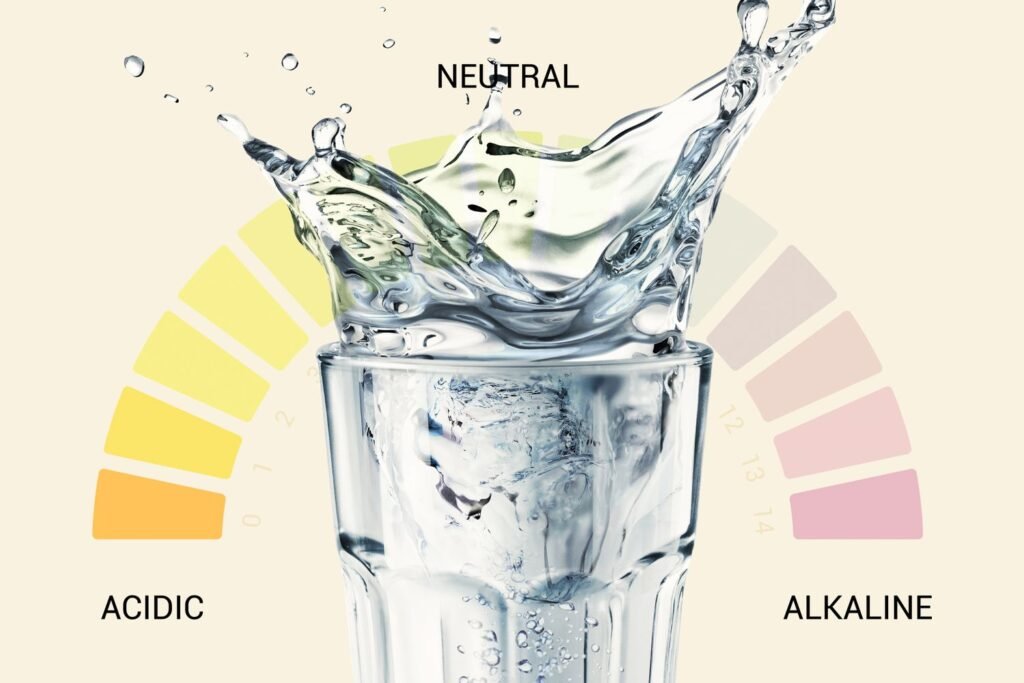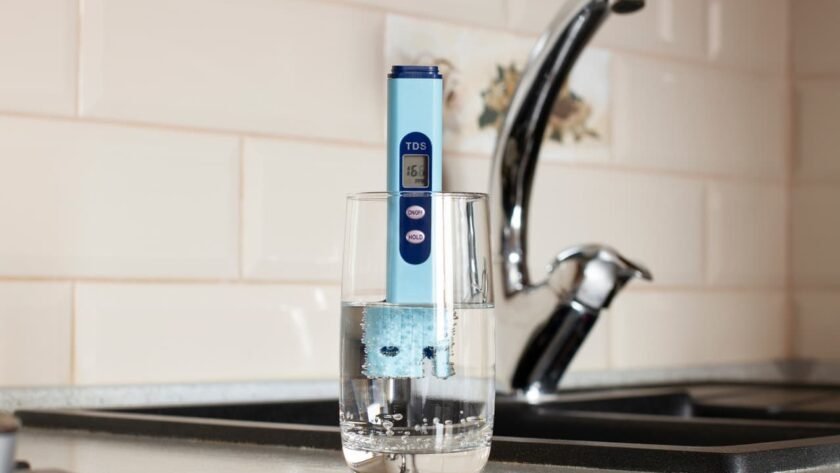Table of Contents
Is alkaline water good for you?
- Natural alkaline water (from springs or wells) can be beneficial due to mineral content
- Artificially alkalized water may pose health risks
The pH scale and how does it relate to the body
- pH scale ranges from 0 (acidic) to 14 (alkaline), with 7 being neutral
- Different body parts require different pH levels
- Blood pH should be slightly alkaline (7.34 to 7.45)
Why shouldn’t we alkalize the body?
- Disrupts natural pH balance in different body parts
- Can lead to health issues like heartburn, acid reflux, and increased infection risk
Importance of stomach acid
- Stomach pH should be very acidic (1-3)
- Crucial for protein digestion, mineral absorption, and pathogen defense
- Low stomach acid can cause various health issues
What are the consequences of low stomach acid?
- Poor protein digestion
- Mineral deficiencies
- Increased risk of infections
- Potential development of allergies
Is acidic water bad for you?
- Slightly acidic carbonated water may aid digestion
- Adding apple cider vinegar or lemon juice can be beneficial
What is alkalosis and its effects?
- Condition where body becomes too alkaline
- Symptoms include muscle issues, heart arrhythmias, and in severe cases, seizures or coma
Where does our water come from?
- Surface water from rain and snow
- Groundwater from deep underground sources
- Possible pre-water forms deep within the Earth
Maintaining proper pH balance in the body is crucial. While natural alkaline water can be beneficial due to its mineral content, artificially alkalized water may disrupt the body’s natural pH levels and cause health issues. It’s important to understand that different parts of the body require different pH levels for optimal function
So let’s dive into the details…
Alkaline Water

Today I’m going to talk about the benefits, the side effects, and the dangers of alkaline water. Now naturally, when you’re drinking water from a spring or from a well or an Artesian well, it’s going to be alkaline. It’s alkaline because of the minerals calcium and magnesium, which are both alkaline.
- Natural spring water is typically alkaline
- Alkalinity comes from minerals like calcium and magnesium
Acidity and alkalinity explained
People have this idea that anything acid is unhealthy or it will cause sickness, and anything alkaline is healthy, which is absolutely not true.
In our bodies, we have a lot of different acids: nucleic acids as in your DNA, you have hydrochloric acid as your stomach acid, you even have lactic acid that’s in your colon to help you digest, you have amino acids and fatty acids. So just because something is acid doesn’t make it bad.

We have this scale of acidity and alkalinity, and right in the center is seven, which is neutral, and distilled water is neutral. As the numbers go up above seven (so you have 7, 8, 9, 10, 11, 12 all the way up to fourteen), things are becoming more alkaline.
Just so you know, at the very top of the list, like 14, which is extremely alkaline, you have things like drain cleaner, bleach (which is I think 13), and soap (which could be anywhere between eight and ten). Those are all alkaline.
- pH scale ranges from 0 (acidic) to 14 (alkaline)
- 7 is neutral
- Many acids are essential for bodily functions
- Extremely alkaline substances can be harmful
Understanding body pH
As we go lower, we get things like lemon juice, apple cider vinegar, tomatoes, and of course soda – those are all acidic.
When we talk about pH in our body, most of the time we’re referencing our blood pH, which normally should be slightly alkaline. If neutral was seven, your blood is 7.34 to 7.45.
I think the biggest myth about pH is that it’s very difficult to change your pH by taking something, and I’m talking about changing the pH of your blood.
Whether someone’s eating more alkaline food or more acidic food, that pH in your blood is probably unlikely to change. Our body tends to control and regulate the pHs of the different parts of our body.
- Blood pH is normally between 7.34 and 7.45 (slightly alkaline)
- Body regulates pH in different areas
- Difficult to change blood pH through diet alone
pH levels in different body parts

For example, your saliva should be slightly alkaline, your blood should be slightly alkaline, your stomach should be very acidic, but your small intestine that goes right after the stomach should be alkaline.
The large bowel should be acidic, not like the stomach, but slightly acidic. Of course, we have the gallbladder and bile, which should be alkaline.
- Saliva: Slightly alkaline
- Blood: Slightly alkaline
- Stomach: Very acidic
- Small intestine: Alkaline
- Large intestine: Slightly acidic
- Gallbladder and bile: Alkaline
Why you shouldn’t alkalize the body
We don’t want to alkalize the body. That’s not a smart thing to do, and primarily the reason for that is because when you take something that’s alkaline, and specifically
I’m talking about alkaline water, you are going to alter the stomach’s pH, which should be between one and three – very acidic.

Doing that is going to come with a package: you may end up with heartburn, acid reflux, gas, GERD, you might have an increased risk of infection, you might have hair loss, you might have arrhythmias.
- Altering stomach pH can lead to various health issues
- Potential problems: heartburn, acid reflux, GERD, infections, hair loss, arrhythmias
Natural vs. artificial alkaline water

I’m not talking about alkaline water from the spring or Artesian well or some type of water that you would get naturally with the minerals.
I’m mainly talking about water that’s created maybe from a machine or something that has nothing to do with minerals. There’s a machine out there that you can get that alkalizes the water, and they don’t add minerals to it.
They put electricity through the water and they alter the water and take out the acidic part, leaving this water very alkaline.
- Natural alkaline water contains beneficial minerals
- Artificially alkaline water lacks minerals and may be harmful
Dangers of artificial alkaline water
I remember in practice once testing someone’s urine after they use this machine for about two weeks, and the pH of their urine, which normally should be acidic, was like nine, which is extremely alkaline for your urine.
This will really put them in a situation where they’re very susceptible to having infections; they can’t kill off microbes that well.
So there are some huge side effects from drinking a lot of extremely alkaline water, but there’s not going to be any side effects from drinking your Spring Water that’s alkaline or some bottled spring water that has a lot of minerals in it because it’s made alkaline in a natural way.
- Artificially alkaline water can disrupt normal body pH
- Increased risk of infections
- Natural alkaline water with minerals is safe
The importance of stomach acid

Here’s some missing information that you need to know: the pH in your stomach should be between one and three, very, very acidic.
The purpose of the acidity is to help you break down protein, to help you absorb minerals, also absorb B12, as well as to kill off pathogens.
I’m talking about bacteria, fungus, parasites that could be in your food. It’s kind of a natural barrier, your immune barrier.
As we age, we lose this stomach acid. People that are taking antacids are putting their pH in their stomach in the wrong direction. Because the actual cause of heartburn, GERD, and acid reflux most of the time is this
your stomach acids are not strong enough, and that valve at the top of the stomach is not closing, so you’re regurgitating acids.
The thing to do to correct this is to take more acids, not to take less acids or not to alkalize the stomach with anything. That just makes it worse.
- Stomach pH should be between 1 and 3
- Stomach acid is crucial for protein digestion, mineral absorption, and pathogen defense
- Low stomach acid can cause heartburn, GERD, and acid reflux
- Antacids may worsen the problem by further reducing stomach acidity
Consequences of low stomach acid
If we alkalize the stomach, we start developing a condition called hypochlorhydria or, like, no acid in your stomach, which is called achlorhydria.

In that situation, not only are you not going to be able to digest protein, so these undigested protein particles get into the small intestine and into the large intestine, and then it starts to affect the immune system in a negative way. You may start developing allergies.
There’s an interesting study done on mice where they got rid of the stomach acid, fed them fish, and they developed allergies to fish protein, which is interesting.
So not being able to digest protein can increase the risk of getting allergies, can create gas, and all sorts of things like constipation.
The other important thing about stomach acids is to be able to absorb iron, calcium, magnesium, zinc, potassium.
Without having stomach acid, you could easily be deficient in these minerals, not to mention the vitamin B12. So all this can create anemia, and it can lead to many other issues.
Of course, this acid kills off microbes, so if you can’t kill off microbes, you end up with microbes in your small intestine.
That term is called small intestinal bacterial overgrowth, which is a pretty nasty condition. So that means every time you eat, you’re going to feel bloated, and it usually is created because your stomach acid is not strong. The side effects from people taking antacids are the same as those who have not enough stomach acid.
- Low stomach acid can lead to:
- Protein digestion issues
- Allergies
- Mineral deficiencies
- Vitamin B12 deficiency
- Anemia
- Small intestinal bacterial overgrowth (SIBO)
Is acidic water bad for you?
Now, should we drink acidic water? Well, personally, I found that when I drink carbonated water, and it’s slightly acidic, I actually can digest better, especially if I add a little teaspoon of either apple cider vinegar or maybe some lemon juice.
- Slightly acidic carbonated water may aid digestion
- Adding apple cider vinegar or lemon juice can be beneficial
Alkalosis explained
Now since we’re on the topic of pH, you want to just talk about one more thing. If you actually develop a condition called alkalosis, which is when your pH is definitely way too alkaline, here are the side effects:
Number one, you are going to have low potassium. You’re going to have low calcium. That calcium is going to bind to protein.

Now this calcium is unavailable for the muscle contraction relaxation effect, and you’re going to start having these weird twitches. It’s called tetany.
Sometimes it’s underneath the eye, sometimes it’s in the arm, it could be anywhere in the body. It can also affect the heart rhythm. You can start developing heart arrhythmias.
The muscle is greatly affected in an alkalosis state. So either the muscle is going to be in spasm, it’s going to be crampy, it’s going to be in pain
it’s going to be weak, but overall you’re going to have some really abnormal sensations in the body, both nerve-wise and muscle-wise. It can even get so severe that you can go into either a seizure or a coma.
- Alkalosis symptoms:
- Low potassium
- Low calcium
- Muscle twitches (tetany)
- Heart arrhythmias
- Muscle spasms, cramps, pain, weakness
- Abnormal nerve sensations
- In severe cases: seizures or coma
The importance of proper pH balance
We don’t want alkalosis, and we don’t want to be too acidic. We want to have the right pH for the right part of your body. Having the right pH, especially in our stomachs, will allow certain enzymes to work.
The enzyme that helps you digest protein is not activated unless you have the strong acid, and the same thing with the small intestine – certain enzymes, like for example for carbohydrates, are activated when it’s alkaline. But like I said before, different parts of your body require different pHs.
- Proper pH balance is crucial for enzyme function
- Different body parts require different pH levels
- Avoid extremes of acidity or alkalinity
Where does our water come from?

You know where I live right now, I actually have Spring Water, and it comes from a spring. We recently drilled for water at a different location, and they had to go, I think, a hundred and thirty feet below rock.
They had to drill through rock like granite to find this water. So I asked the guy, “Where does that water come from?” and he said, “Well, we don’t really know.
Some people say it comes from the rain and snow that melts through and it seeps through the soil and it gets into the Earth and it kind of forms these little pools and pockets.” But my thought is, how does it get through these rock formations?
So I learned about that. It’s still a theory, and where this water comes from got me curious. So I did another deep dive into where our water really comes from, and I found some really interesting information. They actually found the chemistry of water, which is not in the water form.
It is basically hydrogen and oxygen embedded into a mineral, and apparently, this came from a volcano. So it was very, very deep. They actually calculated it to be about 400 miles deep into the Earth, and apparently, which is even more interesting, there’s enough water down there, or at least pre-water that can turn into water, to literally fill up an ocean.
- Water sources can be deep underground
- Some theories suggest water originates from volcanic activity
- Water may exist in a pre-water form deep within the Earth
Natural minerals in water
The advantage of these minerals in water gives us some additional health benefits, but only if they’re created in a natural way, not from a machine that alkalizes the water, which omits that help from the minerals.
- Natural minerals in water provide health benefits
- Artificial alkaline water lacks these beneficial minerals
Summary
Natural water from a well or spring is alkaline. It’s alkaline because it contains minerals like calcium and magnesium.
Many people believe that things that are acidic are unhealthy and things that are alkaline are healthy. But that’s not altogether true. We have a lot of different acids in our bodies that have many important functions.
We don’t need to worry about alkalizing the body. The body regulates the pH in different areas. For example, your blood should be slightly alkaline, but your stomach should be very acidic.
It’s possible to get alkaline water created by a machine that uses electricity to alter it instead of using minerals to alkalize it. If you drink alkaline water that’s created artificially, you’re going to alter the pH in the stomach.
Potential side effects of alkaline water made artificially can include:
• Heartburn
• Acid reflux
• Gas
• GERD
• Infection
• Hair loss
• Heart arrhythmias
However, natural water, like alkaline spring water, has no side effects.
Alkalizing the stomach could lead to a deficiency in stomach acids. The stomach should be very acidic to help you break down protein, absorb minerals and vitamin B12, and kill pathogens. As we age, we lose stomach acid.
Antacids also weaken stomach acid. But, low stomach acid is the root cause of symptoms like heartburn, GERD, and acid reflux. Alkalizing the stomach instead of acidifying it could worsen these symptoms and lead to many other serious side effects.
I’ve found that I can digest better when I drink acidic water, like carbonated water—especially if I add a teaspoon of either apple cider vinegar or lemon juice.
Overall, alkaline water has certain health benefits because it contains minerals. But alkaline water is only beneficial if it’s natural and not created by a machine.
DATA
https://pubmed.ncbi.nlm.nih.gov/20060064
https://pubmed.ncbi.nlm.nih.gov/19482105
https://pubmed.ncbi.nlm.nih.gov/13679824
https://pubmed.ncbi.nlm.nih.gov/19362552
FAQ
Are there negative effects of alkaline water?
While alkaline water is generally considered safe, there are some potential negative effects to be aware of:
- Gastrointestinal issues: Drinking too much alkaline water can cause nausea, vomiting, and diarrhea in some people[1].
- Mineral imbalances: Alkaline water contains minerals like calcium and magnesium. Consuming too much can lead to mineral imbalances, especially in those with certain health conditions[2].
- Disruption of natural pH balance: The body tightly regulates its pH. Excessively alkaline water may interfere with this balance and lead to a condition called alkalosis[2].
It’s important to consume alkaline water in moderation and consult with a healthcare professional if you have any concerns[2][4].
Is alkaline water good for organs?
Alkaline water may provide some benefits for organ health:
- Kidneys: Alkaline water may help kidneys function better by neutralizing acids and flushing out toxins[4]. However, more research is needed.
- Liver: Alkaline water can support liver function by aiding in hydration and detoxification, but it should not replace medical advice[4].
What happens when you drink 9.5 pH water?
Drinking water with a pH of 9.5 is generally safe for most people in moderation. However, there are a few things to keep in mind:
- The body tightly regulates its pH, so excessively alkaline water may disrupt this balance[2].
- Drinking too much could potentially lead to gastrointestinal issues like nausea or vomiting in some individuals[1].
- Those with certain health conditions may need to be more cautious about drinking highly alkaline water. It’s best to consult with a healthcare professional[2][4].
Can alkaline water clean your system?
Alkaline water may help cleanse the body in a few ways:
- Improved hydration: Alkaline water is believed to be absorbed more easily by the body compared to regular water, leading to better hydration[3][4].
- Digestive benefits: Enhanced hydration can help smooth the digestive process, leading to more regular bowel movements and decreased digestive discomfort[4].
- Toxin elimination: By improving hydration and digestion, alkaline water may aid in flushing out toxins from the body[3][4].
How to make alkaline water
There are a few ways to make alkaline water at home:
- Use an alkaline water filter or ionizer: These devices use electrolysis to separate water into acidic and alkaline components[1].
- Add alkaline drops or tablets: Alkaline drops or tablets can be added to regular water to increase its pH. However, these products should be used with caution as spills can cause skin irritation[5].
- Mix baking soda: Adding a small amount of baking soda (1/2 teaspoon per quart of water) can raise the pH of water[4].
- Use lemon or lime juice: While citrus fruits are acidic, they can have an alkalizing effect in the body. Adding fresh lemon or lime juice to water can increase its alkalinity[4].
When making alkaline water at home, it’s important to use clean, filtered water and follow the instructions carefully to avoid any potential safety issues[5].
I drink alkaline water for a month
If you’ve been drinking alkaline water consistently for a month, you may notice some potential benefits:
- Improved hydration: Many people report feeling more hydrated within the first few weeks of drinking alkaline water[4].
- Increased energy levels: By the 3-4 week mark, some individuals notice a boost in energy levels and better digestion[4].
- Skin improvements: Clearer, more hydrated skin may become noticeable due to the elimination of toxins and better overall hydration[4].
- Reduced acid reflux symptoms: Alkaline water can help neutralize excess stomach acid, potentially reducing the frequency and severity of acid reflux episodes[4].
What are the 6 benefits of drinking alkaline water
- Superior hydration: Alkaline water is believed to be absorbed more easily by the body compared to regular water, leading to better hydration[4].
- Digestive improvement: Enhanced hydration can help smooth the digestive process, leading to more regular bowel movements and decreased digestive discomfort[4].
- Improved skin health: Adequate hydration is crucial for maintaining healthy, glowing skin. Alkaline water can help flush out impurities, contributing to clearer skin[4].
- Boost in energy levels: With better hydration and detoxification, the body can function more efficiently, often resulting in a natural increase in energy levels[4].
- Alleviation of acid reflux symptoms: Alkaline water helps neutralize excess stomach acid, potentially reducing the frequency and severity of acid reflux episodes[4].
- Potential support for liver and kidney function: While more research is needed, alkaline water may help support the health of these organs by aiding in hydration and detoxification[4][5].
How much alkaline water can I drink a day
There is no definitive recommended daily intake for alkaline water, as it depends on various factors:
- Individual needs: Factors like age, activity level, and overall health can influence how much alkaline water a person should drink[2][4].
- Moderation is key: Consuming too much alkaline water can potentially lead to gastrointestinal issues or disrupt the body’s natural pH balance[1][2].
- Consult with a healthcare professional: If you have any health conditions or concerns, it’s best to talk to your doctor about the appropriate amount of alkaline water for your specific needs[2][4].
Is alkaline water good for kidneys
Alkaline water may provide some benefits for kidney health:
- Neutralizing acids: Alkaline water can help neutralize excess acids in the body, reducing the workload on the kidneys[4].
- Flushing out toxins: By improving hydration, alkaline water may aid in flushing out toxins and waste products from the kidneys[3][4].
- Potential support for kidney function: While more research is needed, alkaline water may help support overall kidney health by aiding in hydration and detoxification[4][5].
Who should not drink alkaline water
While alkaline water is generally considered safe for most people in moderation, there are a few groups who may need to be more cautious:
- Those with kidney disorders: Individuals with kidney disease or other kidney-related conditions may need to limit their intake of alkaline water, as it can potentially affect the body’s electrolyte balance[2][4].
- People taking certain medications: Some medications, such as antacids or diuretics, may interact with alkaline water. It’s important to consult with a healthcare professional before consuming alkaline water if you are taking any medications[2][4].
- Those with a history of stomach or intestinal ulcers: Alkaline water may not be suitable for individuals with a history of stomach or intestinal ulcers, as it can potentially exacerbate symptoms[4].
- Pregnant or breastfeeding women: While there is limited research on the effects of alkaline water during pregnancy or breastfeeding, it’s best to consult with a healthcare professional before consuming it[2].
Kangen water side effects
Kangen water is a type of alkaline ionized water produced by Enagic, a Japanese company. While Kangen water is generally considered safe, there are a few potential side effects to be aware of:
- Gastrointestinal issues: Drinking too much Kangen water can cause nausea, vomiting, and diarrhea in some people[1].
- Mineral imbalances: Kangen water contains minerals like calcium and magnesium. Consuming too much can lead to mineral imbalances, especially in those with certain health conditions[2].
- Disruption of natural pH balance: The body tightly regulates its pH. Excessively alkaline water, including Kangen water, may interfere with this balance and lead to a condition called alkalosis[2].
- Potential interaction with medications: Some medications, such as antacids or diuretics, may interact with alkaline water. It’s important to consult with a healthcare professional before consuming Kangen water if you are taking any medications[2][4].
What is alkaline water good for
Alkaline water may provide the following potential benefits:
- Improved hydration: Alkaline water is believed to be absorbed more easily by the body compared to regular water, leading to better hydration[3][4].
- Digestive benefits: Enhanced hydration can help smooth the digestive process, leading to more regular bowel movements and decreased digestive discomfort[4].
- Reduced acid reflux symptoms: Alkaline water can help neutralize excess stomach acid, potentially reducing the frequency and severity of acid reflux episodes[4].
- Improved skin health: Adequate hydration is crucial for maintaining healthy, glowing skin. Alkaline water can help flush out impurities, contributing to clearer skin[4].
- Boost in energy levels: With better hydration and detoxification, the body can function more efficiently, often resulting in a natural increase in energy levels[4].
- Potential support for liver and kidney function: While more research is needed, alkaline water may help support the health of these organs by aiding in hydration and detoxification[4][5].




